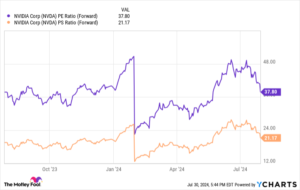These 2 Growth Stocks Are Set to Soar This Summer and Beyond


Summer is here, and with it, a new season to invest in wonderful companies that can grow your portfolio through the years. If you have cash to invest in stocks right now, there are plenty of great companies begging to be bought.
The types of stocks you buy will depend on multiple factors, including your investment preferences, risk tolerance level, and overall financial objectives. Some investors tend to prefer growth-oriented stocks, while others veer toward value or blue chip companies.
Often, the most effective approach is to invest in a variety of companies that represent a variety of industries, and to steadily invest your cash through all market cycles. By doing so, you can ensure your portfolio represents a wide swath of investments that respond to various market triggers in different ways and grow at different rates. This can provide balance as you compound your returns with time.
If you have cash to invest in stocks as the summer kicks off, here are two companies to consider for your buy basket in the very near future.
1. Eli Lilly
Eli Lilly (NYSE: LLY) has been a leader in the pharmaceutical space for nearly 150 years at this point, and its modern era of growth is no less compelling for the long-term investor. Shares are up by close to 50% just in the first half of 2024, as investors have flocked in droves to buy into this company and its success.
Of course, it’s always important to look beyond share price to see what the business is actually doing. Eli Lilly is benefiting from the strength of its core portfolio of blockbuster products, as well as newer entrants to the mix that are driving sales and profits skyward. Tirzepatide, the key ingredient in its weight loss drug Zepbound and diabetes drug Mounjaro, is expected to create a windfall of growth for the company over the coming years.
Analysts think that its tirzepatide franchise alone will bring a combined $34 billion in total revenue to its balance sheet before the end of the decade. Eli Lilly is also studying tirzepatide across other disease areas, including as a potential treatment for obstructive sleep apnea.
Eli Lilly also just garnered a long-awaited approval for its drug for early symptomatic Alzheimer’s disease, Kisunla. In its pivotal late-stage clinical study, Kisunla reduced cognitive decline for participants by as much as 35% compared to the placebo 18 months out and reduced the risk of progression to the next stage of the disease by up to 39%. Some ballpark figures from analysts peg Kisunla’s peak sales potential at $5 billion annually.
Existing blockbusters include the likes of cancer drug Verzenio, which is patent-protected until the end of the decade (subject to possible extensions), as well as antidiabetic medications Jardiance and Trulicity. Over the trailing 12 months, Eli Lilly’s portfolio has generated about $36 billion in total revenue, with profits coming to around $6.1 billion in that same time frame.
The company’s trailing-12-month operating cash flow totals $3.7 billion, and it had about $2.7 billion in cash sitting on its balance sheet at last count. Eli Lilly’s storied commitment to its dividend continues, with a payout ratio of 69% of earnings and habitual dividend increases. Eli Lilly’s forward annual dividend yield is less than 1%, often a function of stocks that deliver above-average share price performance.
However, the stock has delivered a total return of about 275% over the last three years. With its portfolio of new and established medicines, steady investor returns, and a solid balance sheet, Eli Lilly continues to look like a no-brainer healthcare buy that can keep winning for investors for years to come.
2. Airbnb
Airbnb (NASDAQ: ABNB) has done a remarkable job of innovating its business through economic thick and thin while catering to the ever-changing needs of travelers. As the travel recovery has continued, despite the ongoing worries about the trajectory of consumer spending, Airbnb is one of many travel platforms that has benefited.
However, the travel boom is arguably just one of multiple reasons why Airbnb continues to thrive. It operates in a somewhat volatile backdrop in the sense that travel patterns could change if economic conditions and inflation were to worsen notably.
Airbnb’s platform is designed to help any traveler find accommodations that fits their needs virtually anywhere in the world. The ability to take advantage of opportunities like pooling funds and staying in a single place with friends for vacation, staying with a local family in a foreign country, or renting an Airbnb for months at a time are just a few examples of the flexibility that is core to the platform and its model.
The versatility of Airbnb’s use cases means that it benefits from different types of spending across a variety of regions, and while vacationers are certainly a big piece of the pie, leisure travel is not the only needle-mover here. Growth in short-term stays is still outpacing long-term stays, but various initiatives to make long-term stays more affordable for users have made a difference.
In the first quarter of 2024, long-term stays of 28 days or more totaled 17% of gross nights booked. Meanwhile, nights booked for long-term stays of three months or longer rose 25% in the quarter compared to a year ago. Even though Airbnb has been taking aggressive steps to remove low-quality listings from its platform, active listings still soared 15% year over year in the quarter.
Cross-border nights booked on Airbnb rose 10% compared to the first quarter of 2023, totaling about 46% of total gross nights booked. About 80% of its bookings are for group trips, demonstrating that Airbnb is an ideal solution for travelers who don’t want the average hotel stay. Most guests book Airbnbs through the mobile app now, with 54% of total nights booked occurring on the mobile app in Q1.
Over the trailing 12 months, Airbnb has generated $10.2 billion in revenue with just shy of $5 billion in net income. With its profit margin of nearly 50%, its asset-light model is clearly another advantage, even if economic conditions worsen, because Airbnb doesn’t own or operate the properties listed on its platform.
It had over $11 billion on its balance sheet at last count, while trailing-12-month free cash flow surpassed $3 billion. Airbnb looks well-positioned to ride out any near-term issues, and the exceptional performance of its business can continue to compound meaningful returns for long-term investors over the next five to 10 years.
Should you invest $1,000 in Eli Lilly right now?
Before you buy stock in Eli Lilly, consider this:
The Motley Fool Stock Advisor analyst team just identified what they believe are the 10 best stocks for investors to buy now… and Eli Lilly wasn’t one of them. The 10 stocks that made the cut could produce monster returns in the coming years.
Consider when Nvidia made this list on April 15, 2005… if you invested $1,000 at the time of our recommendation, you’d have $688,005!*
Stock Advisor provides investors with an easy-to-follow blueprint for success, including guidance on building a portfolio, regular updates from analysts, and two new stock picks each month. The Stock Advisor service has more than quadrupled the return of S&P 500 since 2002*.
*Stock Advisor returns as of July 22, 2024
Rachel Warren has no position in any of the stocks mentioned. The Motley Fool has positions in and recommends Airbnb. The Motley Fool has a disclosure policy.
These 2 Growth Stocks Are Set to Soar This Summer and Beyond was originally published by The Motley Fool








